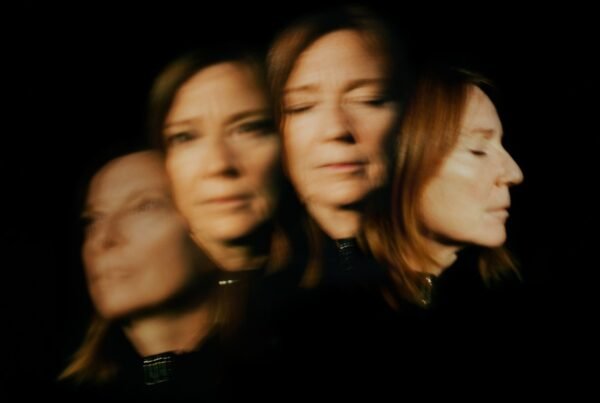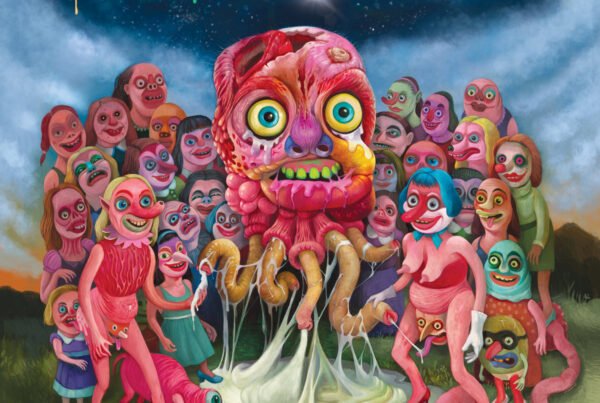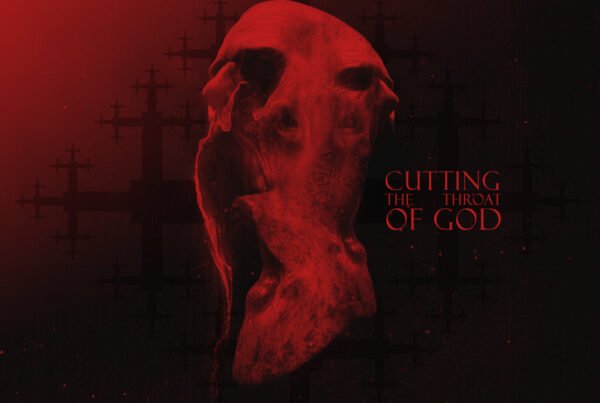Originally from Sacramento, California, Mason Lindahl now resides in New York City. He grew up listening to folk and country music, and has developed his own style of minimalist classical guitar which retains a folk influence.
Kissing Rosy in the Rain is a collection of meditative, lonely tunes, expertly recorded by Jay Pellicci (from 31Knots and Natural Dreamers), Robby Moncrieff, and Ben Greenberg (Uniform/Hubble). The sound is superb. The rawness of these compositions is captured in stunning detail – fingers sliding up and down the frets are just as much a part of these recordings as the notes themselves. It’s as if you’re in the room with Lindahl while he’s playing: you and nobody else.
For the most part, Lindahl plays in a fingerpicking style where the chords aren’t strummed but picked in arpeggios. The notes rain down in cascades, as if you’re listening to a harp or a West African kora. Nowhere is this style more evident than in the angelic opening track, “Sky Breaking, Clouds Falling”, where the runs burst from Lindahl’s fingers in waves.
One of the lighter moments on the record comes in the way of “Rising” – a contemplative flamenco piece played over a barely noticeable organ drone that pulsates in and out of the mix. From this point on though, the LP only gets darker.
“Outside Laughing” is a lovely piece of strumming and picking with space, creating the sombre mood that the rest of the record will follow. It conjures images of tumbleweed and harsh landscapes, like something Ry Cooder might have written for Paris, Texas, without the slide. There are moments like this all over the album. These tunes are bleak, and there are noticeable imperfections in Lindahl’s playing as though the entire record was recorded in one take. But it’s this darkness and imperfection that makes this music so enticing.
“Soft Light” brings the most intimate moment on the record. It’s a haunting, sparse tune played mostly on the lowest strings of the guitar. You can hear the creak of leather and wood of Lindahl’s chair and floorboards as he gently picks the notes. It’s so intimate that it’s almost embarrassing to listen to – like you’re invading his privacy at the darkest moment.
One of the strengths of the LP is the restraint that Lindahl shows. He’s obviously a very talented guitarist and while his fingerpicking is impressive, most of it is played at a slow tempo. There is no flash here. And together with the quality of the recording, this restraint creates an intimate atmosphere. There is no attempt to attract the casual listener; this is painful stuff. It’s as if Lindahl plays in a meditative state that’s desperately sad, and he’s asking you – the listener – to surrender to this dark soundscape that he’s created.
The title track does offer some respite. It is a stunning harp-like piece. The melody ebbs and flows as Lindahl employs a generous amount of rubato. It’s one of the prettier songs on the record and, while the melancholy is still plainly evident, there is a glint of romance here.
But the general mood does become a little tiresome towards the back end of the record. By the time the beautiful but bleak “Deep Wish” comes along, you’re longing for some glimmer of hope, only to be served up with the depressing “In Lieu”, which feels entirely unnecessary.
The closing track, “Fantasy in Spectacle”, does offer a change of pace, though. Lindahl’s fingerpicking sways from gentle to frantic as he searches for some resolution to the anxiety expressed throughout the album. The track gets heavier and more desperate, as if Lindahl is clinging to reality as the darkness descends. It eventually rises to a dramatic, strummed crescendo, only to finish with a flutter of peace in the final bar that offers that glimmer of hope you’ve been waiting for.
In these trying times, Kissing Rosy in the Rain is a fitting tribute to our collective loss. It so openly expresses one man’s personal loneliness and allows us an outlet for our own. But it never loses touch with what we’ve lost in the first place, and that optimism shines through in a record that’s otherwise mired in emotional turmoil.






